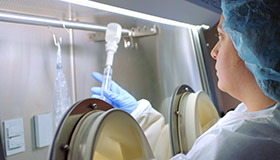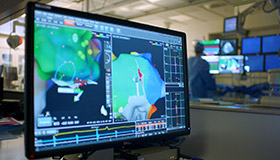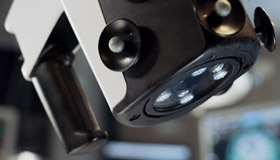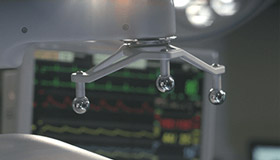
Endoscopic stricturotomy: An innovative approach to treating IBD-related strictures
As a personal trainer, wife, and mom, nothing is slowing Megan Wollerton down. Not even her Crohn’s disease.
After being diagnosed with Crohn’s — an inflammatory bowel disease — in 2008, Megan had surgery with ileocecal resection and anastomosis in October of 2013. While the surgery left her feeling better, three years later, Megan developed a stricture at her anastomosis site.
This stricture caused bloating and extreme pain in her intestine, and Megan was hospitalized. A CT scan and colonoscopy confirmed the stricture diagnosis. After having an endoscopic balloon dilation, the pain continued, and it seemed as though there would be another major surgery in her future.
The proposed surgery, while a good option, tends to be ongoing for Crohn’s patients like Megan. That’s when Allegheny General Hospital Gastroenterologist Gursimran Kochhar, MD, changed everything.
An innovative, less invasive approach
Rather than the suggested surgery, Dr. Kochhar recommended a new approach — an endoscopic stricturotomy. When in expert hands, this endoscopic electrosurgical knife procedure is less invasive and a much safer way to treat strictures in the GI tract.
“He said he could do a procedure that would only take two hours, and I’d be able to go home that day,” Megan recalled. “I couldn’t believe it.”
Dr. Kochhar successfully completed the stricturotomy, and Megan no longer feels symptoms like abdominal pain or cramping. She hasn’t been hospitalized for over nine months, and she’s able to eat her favorite foods again.
“It was life changing. The procedure only took a couple of hours, I was home that night, and back at work the next day. 48 hours later and it was like nothing had ever happened.”
Optimistic about the future
While Megan’s diagnosis will cause her to have this procedure again, it’s significantly lengthened the time between surgeries.
“With the old approach, I would have needed surgery every three to five years, like many other Crohn’s patients,” Megan reflected. “Now, Dr. Kochhar thinks he can space out the need for my surgeries even more.”
As a woman in her thirties who had a baby last year, having to spend less time in a hospital or in bed recovering is truly remarkable.
“I’m self-employed. If I can’t work, I can’t make a living. Now, I don’t have to miss time with my clients, my family, or my friends. My life doesn’t have to be put on pause because of my condition. I can keep on living.”
Contact Us
If you’re experiencing some type of digestive, liver, or pancreatic issue, request an appointment with one of our experts or get more information on Allegheny Health Network’s gastroenterologists.





